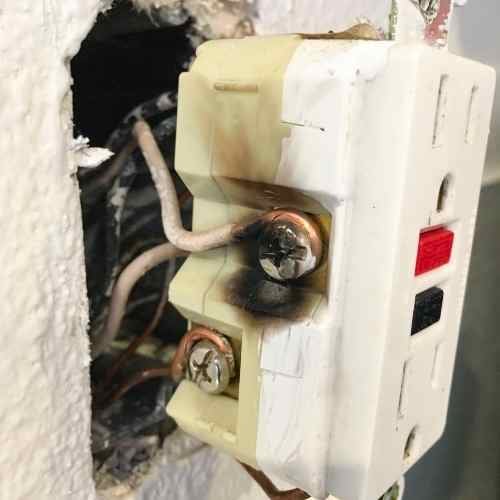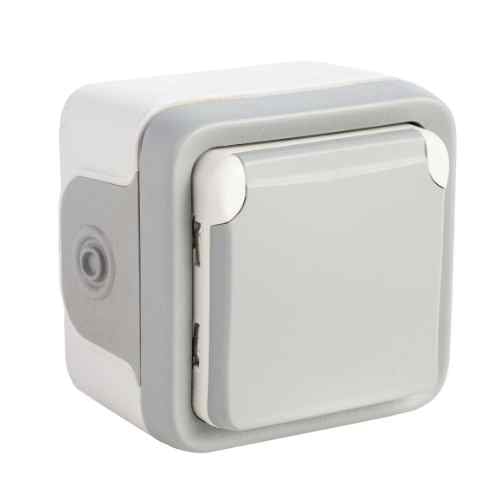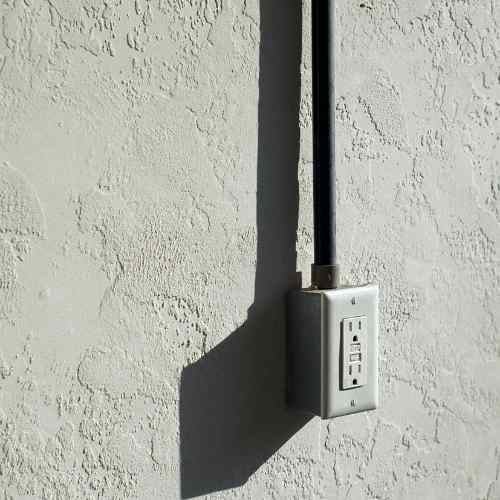If your GFCI outlet keeps tripping, there are a few possible reasons. The most common cause is that the GFCI outlet senses a ground fault, which means an electrical current flows through the grounding wire.
Ground-Fault Occurrence
That can happen if the grounding wire is damaged or if there is something plugged into the outlet that is causing a short circuit. Another possible reason for tripping GFCI outlets is faulty is the circuit breaker.
If the circuit breaker is not working correctly, it can cause the GFCI outlet to trip. Finally, it can also trip if the GFCI outlet has installation problems.
Ground faults occur when the hot or live wire contacts the ground wire. For example, that can happen if the wires' insulation gets damaged, exposing the live wire. Once the live wire touches the ground wire, it creates a circuit, and electricity will flow through this circuit to the ground.
If you're not sure why your GFCI outlet is tripping, you should call an electrician to take a look. They'll be able to diagnose the issue to ensure the outlet is proper.

GFCI Protection
GFCI outlets protect against ground faults by design. They work by constantly monitoring the current flowing through the hot and neutral wires. Any imbalance indicates a ground fault, and the GFCI will trip, cutting off power to the outlet.
Common Causes Of GFCI Outlet Tripping
There are a few common causes of GFCI outlet tripping. Consider these issues to determine what could go wrong:
Damaged Wiring - Damaged wiring is one possible cause. If the wiring is damaged, it may not be able to properly conduct electricity, which can cause the GFCI outlet to trip.
Another probable cause is a loose connection. If the wires are not tightly connected, they may not be able to conduct electricity properly.
Damaged wires can cause the GFCI to trip. In addition, damaged insulation can allow the current to leak out, while bare cables can create a short circuit. Check for all of these conditions when you troubleshoot.

Loose Connections - The most common cause of GFCI outlet tripping is loose or poor electrical connections.
Over time, the wires and other components inside the outlet can become loose, causing a loss of contact and an interruption in the flow of electricity. That can cause the GFCI to trip, interrupting power to the circuit.
Excessive Ground Moisture - Another common cause of GFCI outlet tripping is moisture. If the outlet is in an area prone to moisture, such as a bathroom or kitchen, it can become wet and cause the GFCI to trip.
Even a tiny amount of moisture can cause the GFCI to trip, so it's essential to ensure that the outlet is dry and free of any water before using it.
Excessive Rust On Ground Wires - Over time, rust can build up on the grounding wires connected to your GFCI outlets.
That can cause the outlet to trip when it's on, as the increased resistance from the rust can cause an imbalance in the current flowing through the circuit.
Loose Connections - Another common cause of GFCI outlet tripping is loose connections.
If the wires are not connected tightly to the terminals, they can vibrate loose, causing an imbalance in the current and triggering the GFCI to trip.
Dirty Or Corroded Terminals - Corrosion on the terminals can also cause problems, as it can create a high resistance path that can trigger the GFCI to trip.
Environmental Factors - Environmental factors such as dust, dirt, and moisture may cause GFCI outlets to trip. These can all create a high resistance path that triggers the GFCI to trip.
If your GFCI outlet keeps tripping, it's essential to identify the cause so you can fix the problem and prevent future issues.
Damaged Outlets - Another common cause of GFCI outlet tripping is damaged outlets. If the outlet is damaged, it may cause the GFCI to trip. Therefore, it's essential to ensure the outlet is in good condition before using it.
It's worth inspecting the outlet visually to see if you can identify any obvious problems. If you do, save yourself time and trouble and replace the unit.

Moisture In The Receptacle Box - Moisture accumulation is another possible cause. One of the most prevalent causes of GFCI outlets tripping is moisture in the receptacle box.
If there's any moisture present in the box, it can cause the GFCI to trip. The optimal way to prevent this is to ensure that it's dry before you plug anything into it.
Electrical Fault - An electrical fault is one of the most common causes of GFCI outlet tripping. That can occur when there's a loose connection in the electrical circuit or a problem with the wiring itself.
If you have an electrical fault, the best bet is to repair it as soon as possible to prevent additional damage.
Water Damage - Another common cause of GFCI outlet tripping is water damage. If you discover water damage, you don't have time to initiate repair. Any delay can result in significant losses and damage.
Overloaded Circuit - An overloaded circuit is another common cause of GFCI outlet tripping. Overloaded circuits occur when you use too many appliances on the same circuit, or the wiring has a problem.
Fortunately, you can temporarily fix this issue by shifting your electrical devices to other outlets, thus reducing the load on the circuit.

Outdoor Weather - Outdoor weather also causes GFCI outlet tripping. It happens when there's a problem with outdoor area wiring or if there is a problem with the GFCI itself.
If your GFCI outlet is tripping, don't panic. There are several potential causes and solutions to the problem.
The best way to find out what's wrong is to call a professional electrician like Premiere Electric. With years of experience diagnosing and fixing electrical problems and can get your home back up and running in no time.
So don't let a faulty GFCI outlet disrupt your life - call us today!




.jpg)